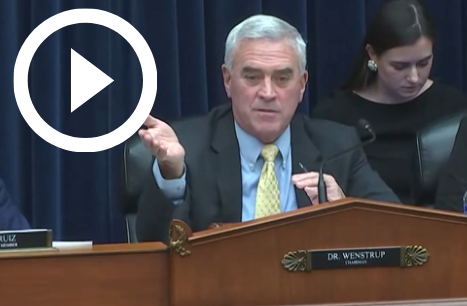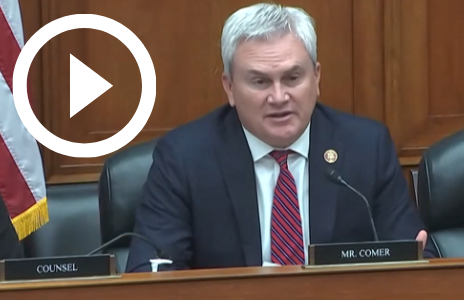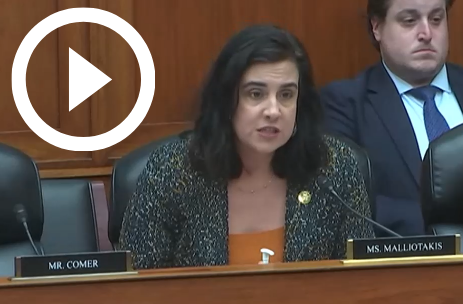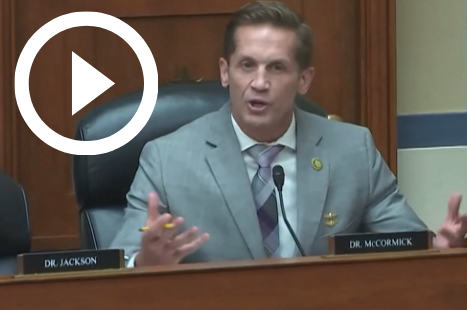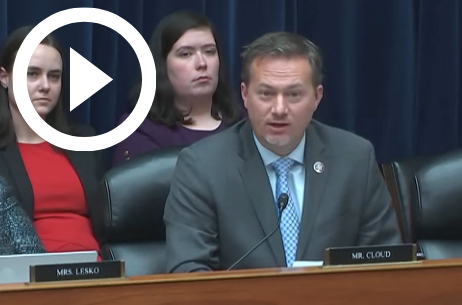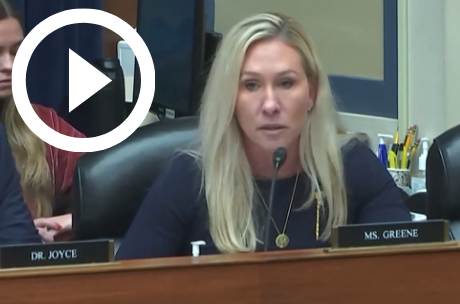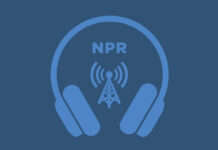The Select Subcommittee on the Coronavirus Pandemic held a hearing titled “Reforming the WHO: Ensuring Global Health Security and Accountability” to examine the effectiveness of the World Health Organization (WHO), assess its response to the COVID-19 pandemic, and explore areas for improvement. Three Biden Administration officials from the U.S. State Department, U.S. Agency for International Development, and U.S. Department of Health and Human Services were in agreeance that the Chinese Communist Party was not transparent in sharing COVID-19 information with the world and that the WHO must be reformed before the world faces another pandemic. Select Subcommittee members discussed the existing, severe flaws within the WHO framework, described the CCP’s cover-up of COVID-19 — which was aided by the WHO — and demanded American interests be placed at the forefront of WHO reform discussions. Throughout the pandemic, the WHO shied away from placing any blame on China and must be held accountable. The Select Subcommittee remains committed to revealing any wrongdoing by China, the WHO, and other public health officials in order to prepare our country for the next health crisis.
Key Takeaways
The World Health Organization caved to political pressure from the Chinese Communist Party and placed CCP interests ahead of global public health. It is now time to hold China accountable for its intentional coverup of COVID-19.
Select Subcommittee on the Coronavirus Pandemic Chairman Brad Wenstrup opened today’s hearing by detailing four major examples of the WHO bowing to political pressure from the CCP: “We saw the WHO deny that COVID-19 was spread via human-to-human transmission, based entirely on the word of the Chinese government. The WHO delayed naming COVID-19 a Public Health Emergency of International Concern, a World Health Organization procedure that, amongst other things, would have allowed for the procurement and distribution of scarce supplies, all because the Chinese Communist Party told them the spread was under control. The WHO delayed serious measures to counter the global spread of COVID-19, because the CCP was only worried about their own bottom line. When the WHO produced a report evaluating the possible origins of COVID-19, it became unquestionably evident that the entire report was nothing but more Chinese propaganda.”
Biden Administration officials from the U.S. State Department (State), U.S. Agency for International Development (USAID), and U.S. Department of Health and Human Services (HHS) all agree that the World Health Organization is in urgent need of reform.
Ms. Loyce Pace, Assistant Secretary for Global Affairs at HHS, admitted that the WHO is not sufficiently structured to serve the world and described the way HHS is working to reform the organization: “If the WHO didn’t exist, we would have to create it. That said, the COVID-19 pandemic also revealed major gaps in our global health security architecture, including and importantly, at WHO. Working with likeminded Member States, the U.S. is leveraging our seat at the table to drive dialogs and solutions required today, because unfortunately, we’ve learned the hard way that this is in our national interest.”
Ambassador John Nkengasong, Senior Bureau Official for Global Health Security and Diplomacy at State, committed the Biden Administration to ensuring the WHO implements comprehensive reform: “This administration is firmly committed to ensuring the WHO implements a comprehensive set of organizational reforms, particularly to strengthen its governance, budgetary and financial management processes and improve oversight to strengthen the organization’s efficiency and effectiveness.”
Dr. Atul Gawande, Assistant Administrator for Global Health at USAID, recognized the failures of the WHO during the COVID-19 pandemic and noted USAID’s role in reforming the WHO in preparation for a future health emergency: “The COVID-19 pandemic exposed significant fractures in our global health security systems and structures, including at WHO. In lockstep with our interagency partners, USAID continues to push for critical reforms at WHO, applying lessons learned from recent disease outbreaks to increase effectiveness, transparency, agility, and accountability to better respond to future health emergencies and meet our other public health goals.”
As the WHO drafts a new Pandemic Accord and amendments to the International Health Regulations, it is essential that American interests and sovereignty are protected.
Dr. Atul Gawande explained the importance of protecting American sovereignty when Member States meet to discuss WHO reforms: “We want respect for our sovereignty, and so we also limit how much WHO can control or demand things of us. And that is one of the challenges here, that we are protective of our own sovereignty and therefore do not want to have those tools challenged or potentially challenge us or other Member States…We’re looking for a three-level set of tiers so that there is an earlier indication when countries have a health issue developing of concern, there are clearer standards about what transparency requires, and then clear requirements that WHO has to live up to for reporting, making public and indicating when countries are not adhering to those.”
Member Highlights
Select Subcommittee on the Coronavirus Pandemic Chairman Brad Wenstrup (R-Ohio), D.P.M, elicited agreement between all three executive branch witnesses that China was not sufficiently transparent or forthcoming throughout the COVID-19 pandemic.
Chairman Wenstrup: “With your knowledge of what we have now and looking at COVID-19, I ask, was China, in your opinion, forthcoming and transparent regarding COVID-19?”
Assistant Secretary Pace: “With regards to your question, it’s an important one, especially because we have a lot of lessons to learn regarding COVID-19. Unfortunately, one of those lessons is the importance of transparency. We are quite disappointed and share your frustration with the government of China for not being as forthcoming as they should have been.”
Ambassador Nkengasong: “We fully agree with your opening remarks about the trust capital that is required to deal with global diseases. That comes with the ability to be fully transparent, to be accountable, to report in a timely fashion, and also to cooperate. All of these elements were lacking in China’s ability to cooperate with WHO and the world.”
Assistant Administrator Gawande: “I’m in complete agreement with my colleagues. China was not forthcoming early on about human-to-human transmission.”
Committee on Oversight and Accountability Chairman James Comer (R-Ky.) shed light on HHS Global Affairs Assistant Secretary’s effort to evade questions about China’s culpability during COVID-19.
Oversight Chairman Comer: “Do you believe that the Chinese government ought to be held accountable for the lack of cooperation in the early days of the pandemic? Ms. Pace.”
Assistant Secretary Pace: “Thank you, sir. We do think that the International Health Regulations, in improving those, will make all countries…”
Oversight Chairman Comer: “But should China be held accountable?”
Assistant Secretary Pace: “We believe all countries should be held accountable.”
Oversight Chairman Comer: “Do you not think China’s a little special in this situation since it came from China, and they completely lied and were not truthful with the world population about the outbreak of COVID 19. That they had veto power over who America put on boards and rejected, reports that we now know could have been helpful.”
Assistant Secretary Pace: “I share your frustration with China’s lack of cooperation.”
Oversight Chairman Comer: “But shouldn’t we hold China accountable?”
Assistant Secretary Pace: “Well, that’s something that we’re trying to do by amending the International Health Regulations and ensuring that violations can’t happen in the way that they did previously.”
Rep. Nicole Malliotakis (R-N.Y.) laid out indisputable evidence that covering up the failures of the Chinese Communist Party was common practice at the World Health Organization throughout the pandemic.
Rep. Malliotakis: “I’m really concerned about what we’ve seen from the WHO throughout the COVID-19 pandemic. I mean, they deny human-to-human spread of COVID-19 based solely on CCP propaganda. It was not until January 23, 2020 that the WHO finally recognized that human-to-human spread was occurring. It was a month after the first warnings. The WHO delayed naming COVID-19 a public health emergency. It delayed serious measures like travel restrictions because the CCP told them the spread was under control. The WHO continued to praise the Communist Chinese Party’s failed efforts to combat the pandemic despite a globally recognized cover up.
“And then when we pushed for an investigation into the origins, the CCP was given full veto power over inclusion of American scientists. The Communist Chinese vetoed the three Americans put forward by our government to be in that investigative body, and the CCP was given full power to edit and alter the final reports.”
Rep. Rich McCormick (R-Ga.), M.D., argued that American interests should always be at the forefront of global discussions on reforming the World Health Organization in order to ensure U.S. sovereignty is prioritized.
Rep. McCormick: “Let me be clear, the United States should never ever allow international organizations, specifically the World Health Organization, to impede our sovereignty, which I know you just reaffirmed. With that said, I think that when you designed the World Health Organization, it was intended to be idea gathering, an observer, an informant to nations around the world with a goal of providing interchange of information from different health care organizations for emergencies.
“However, the Biden administration must ensure the WHO authority is limited to setting public health standards and providing a forum for countries to exchange information, but not to be given greater authority to infringe on our nation’s sovereignty…Can you both commit to complete transparency during these processes?”
Assistant Secretary Pace: “Yes, sir.”
Ambassador Nkengasong: “Yes.”
Rep. Michael Cloud (R-Texas) slammed the World Health Organization for caving to the political interests of the Chinese Communist Party instead of prioritizing global public health.
Rep. Marjorie Taylor Greene (R-Ga.) broke down major American concerns with the Biden Administration’s proposed amendments to the International Health Regulations — a legally binding agreement that requires all countries to conduct surveillance of potential international health threats.
Rep. Greene: “The International Health Regulations, the IHR, is a treaty of the WHO, meant to usher in a new era of global public health that requires all member states to cooperate to make the world more secure…In an October 2023 meeting, the working group compiling the amendments for the 77th World Health Assembly in May 2024 was told that they do not have to produce their document before the meeting.
“Some of the amendments include expanding the ability of the WHO Director-General to declare public health emergencies, to include regional declarations as well as intermediate threats, allowing Director-General to act on information in the public domain without verification from Member States, and creation of a compliance committee to enforce their rules. I can assure you the American people do not want the WHO enforcing any rules on their own personal decisions regarding their health.
“If certain amendments are adopted next year, sovereign countries, including the United States, would be obligated to adhere to the treaty. The Biden administration led the charge for amendments to the IHR, including a new compliance committee…The move toward a global health security state is reliant upon surveillance, which relies on data. Remember China? That’s what they did to their citizens and still do. The treaty and the IHR call for more sharing of personal health data in the name of safety and outbreak prevention. That’s an invasion of privacy for the American people.”





